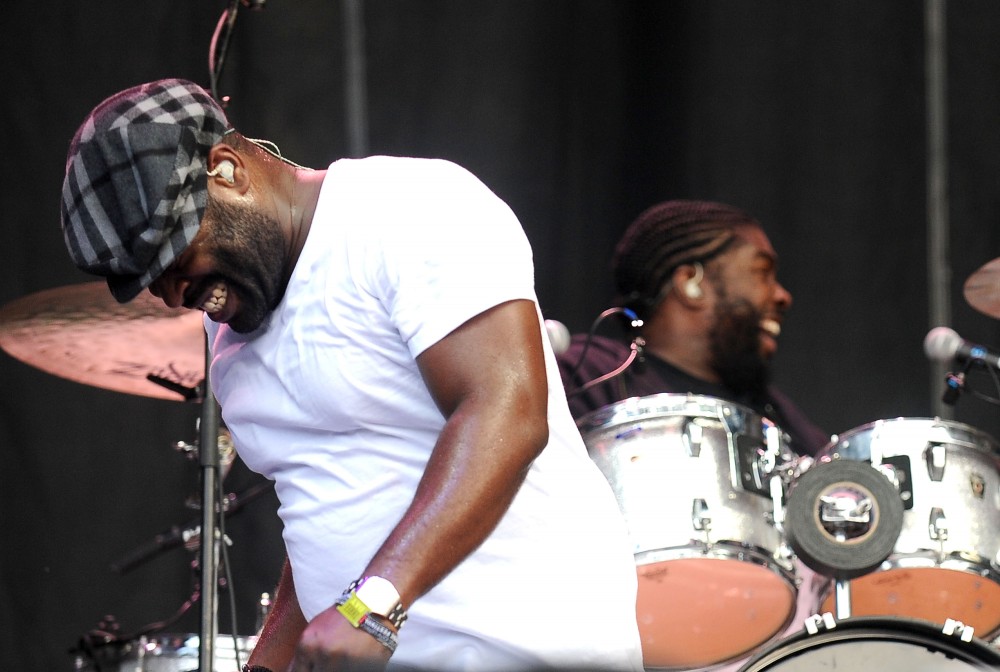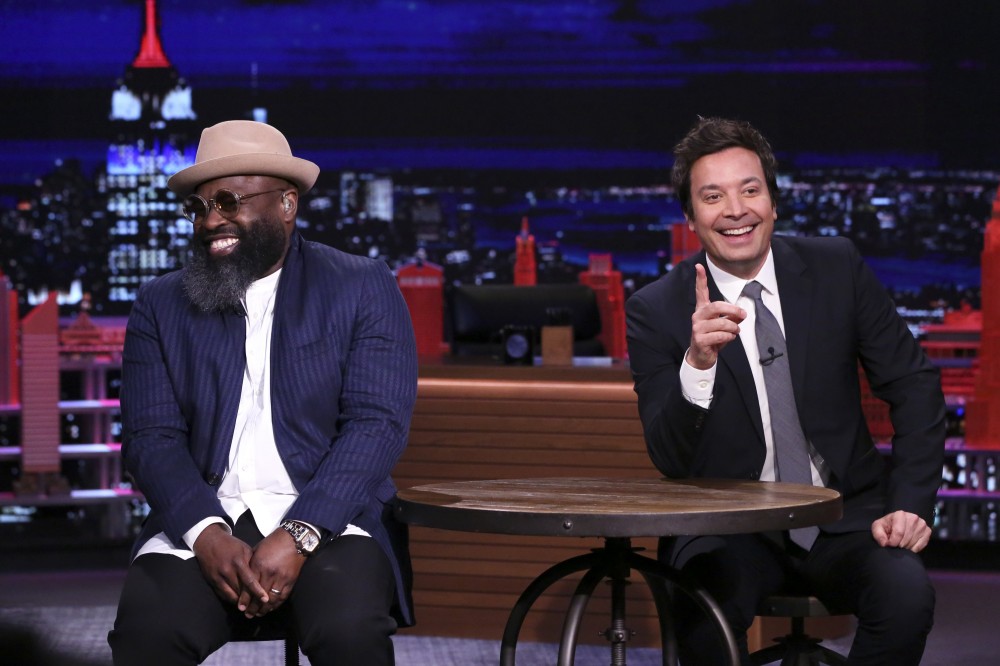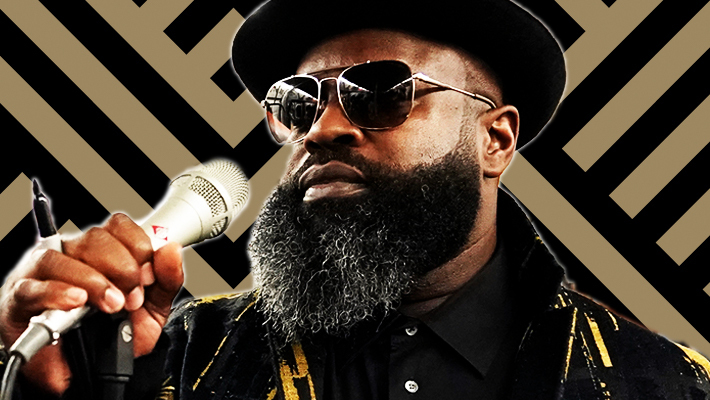There’s a kind of intimacy that comes from hearing someone recount the odyssey of their life. Subtle sways in tone that give away the emotion behind a certain beat in the story. 7 Years (which you can hear on Audible), by Tariq Trotter, aka Black Thought, delivers on that promise as we learn about the hip-hop icon’s childhood, the emergence of The Roots, and his many influences — both in music and life. But it’s not an obvious choice for anyone to be this open and introspective.
In this expansive interview, we spoke with Trotter about opening up, his guiding philosophy about control and flexibility, anxiety about joining forces with Jimmy Fallon, his influences, and not forcing music history onto a younger audience.
What’s the motivation behind going deep and telling your story like this? Is it a want to be more deeply understood or is it more about doing a personal excavation?
I think it was initially about being more deeply understood, but as you embark on that sort of project, different layers sort of reveal themselves during the process. So there’s definitely a certain degree of self-discovery that takes place, which is the beautiful part. For someone like me who hasn’t been as accessible as I am in this moment in time… I’ve shared personal stuff about my past and my family in Philadelphia and The Roots early on in our career and stuff like that, but I’ve never gotten too deep into any of it. So there’s something to be said about just sort of getting things off your chest and off your shoulders and just being able to lift some of those weights and to be more transparent. I was able to be vulnerable, on the 7 Years project, in ways that I’ve yet to in my music.
Why do you think you haven’t been as open in the past?
I’m a guarded person by nature, and I’m sure some of it has something to do with the time and place from which I come, but, you know, it’s a habit. I feel like it served me, it served me fine throughout my career to not necessarily be in the forefront, to not necessarily share that much information about my personal life. That’s the way that I’ve moved, so it was a decision that I made earlier on. [But] I feel like, at this point in my career, it’s sort of the final frontier. If you asked someone who’s a long-time fan and who has supported us over the years, what they’d like or what would be ideal for them in a project… which I’ve done, and people tell me, “I would just like to know more about you. About the person.” So, it’s a delicate balance because I am still very private, but yeah, I feel like this is sort of the ideal time to open up in that way.
I subscribe to a lot of what you were saying about the need to be flexible and kind of realizing our smallness against the forces of nature, the wind, as you use as a metaphor or the waves. When did you kind of land on that as sort of a bedrock principle with the need for reinvention every seven years and that need to be flexible?
I don’t even know that I had it when I was coming up, as much as it was something that dawned on me as an adult. I would say, in recent years, it’s something that I came to understand. Before then, it’s something that I always felt but never really could put my finger on why I felt that way. I wasn’t able to make sense of it until more recently, I would say.
We all have this healthy ego and we see ourselves as this indestructible force, but to have that ability to step aside and realize that we’re not and we need to kind of just try to hang on to as much as we can while surviving is really fascinating to me.
I agree. You know, when you think of things like the overview effect, and how that affects astronauts who leave Earth’s atmosphere and go out into space, it can be overwhelming for some. It depends on sort of how you’re prepared for it mentally. It could be overwhelming or it could be… It’s definitely life-changing, from what I understand, but it could be just this huge, more of a revelation when you sort of come to understand… not only the role that we play here on the planet but just how small of a cog the planet Earth is in the machine that is the universe. I feel like there are parallels in just the level of acceptance that you need to exercise in order to sort of come through, come out on the other side of it, without losing your mind. I think it’s comparable to that.

It seems clear that you guys were looking at the Fallon job as a clear pivot, but when you went into that situation, did you envision that it would be that much of a commitment and this long-term of a thing?
No. I don’t think we had a complete understanding of how much of a commitment we were getting into, or how long of a run it would be. I feel like so much has happened over the past 12 years. Then I also feel like 12 years has sort of gone by in the blink of an eye. I don’t think we had any clue. We also had no idea how we were going to sort of navigate all our other endeavors and sort of balance that stuff out. Would that sort of be the end of one version of The Roots and the beginning of another? Obviously, yes, on some levels. Would we sort of lose ourselves in the process? That sort of remains unknown. You have to sort of watch it unfold in real-time.
It has been a blessing working on The Tonight Show and just working in the capacity of a comedian and just being in front of an audience every day and being on TV every day has only made us better. I think it’s made us sharper, it’s made us a tighter unit as a collective, just a higher level of artistry and brotherhood and everything that sort of goes with it. I feel like it’s definitely the best decision, but we couldn’t have known at that point in time.
Being more home-based during that time, as opposed to traveling as much — how do you think that’s influenced you? From the albums that you’ve recorded during this time to even this project, because I would guess that you could say that maybe you wouldn’t be as willing to be accessible if you hadn’t had that exposure constantly with Fallon. Is that fair to say?
Yeah. I think that might be fair to say. There’s a certain level of reinvention, reintroduction, like reminder introduction that takes place when you have a long career working in one capacity and then you pivot in the way that we did. I’m constantly trying to sort of … I mean, not that I’m frantic about it, or something that happens on as much on a conscious level as it does on a subconscious level. To a certain extent, I am just trying to balance the identity that people sort of know me as. You know what I mean?
Yes.
There are folks who weren’t familiar with The Roots before we came to NBC, who only know me as Tariq from The Tonight Show. They think I’m funny and they know I’m quick-witted and I can improvise songs on the spot. They don’t really know or understand the journey, or realize that from which The Roots sort of come. Then there are people who were diehard Roots fans from day one, who don’t necessarily know this person. They’ve gotten to know the person that I am or what my identity has become on The Tonight Show. Just like trying to balance that out is something that happens constantly. It’s a continuous thing. So, you just go from one end of the spectrum, and just as soon as you’ve sort of balanced out everything on that end, you need to return to the opposite end to restore balance down there.
Were you worried about that kind of situation when you jumped into this job, the idea of people only knowing you from The Tonight Show, not knowing how deep The Roots music goes? Also, are you surprised at how comfortable you’ve become with the knowledge that “Okay, some people know me for this, some people know me for that”? Where was your headspace then versus now?
I definitely feel it was a concern in the beginning. We had worked very hard, and we had made very many sacrifices, even at that point in our career, which ’07 was when we first met Jimmy. ’07 or early in ’08, something like that. Yeah, we had already made so many sacrifices just to maintain a certain level of integrity and to maintain a certain bar that we set with the brand. Yeah, it was definitely a concern. I was concerned that we were starting from ground zero again in very many regards. So there was that. Over the years, I have sort of been … I’ve surprised myself, just with my evolution… as a storyteller and as a musician and as an actor and as a comedian and TV personality, costar. Being able to sort of step up to the plate in all the different regards. I surprise myself. Sometimes I got to jump back and kiss myself. [Laughs] No, I’m just playing.

This project also has the benefit of being able to take some of those fans that only know you from The Tonight Show and introduce them to the deeper complexity of your work and The Roots.
Absolutely. I think this project is able to function as the perfect sort of bridge on either side. For people who may have thought, or may have had a certain impression of what it’s like to be on a TV show, or ways in which my life may or may not have changed, I think I sort of paint an accurate picture. You know? And it serves as a bridge.
The situation with Questlove and with DaBaby where DaBaby said he didn’t know who Questlove was when responding to the criticism Questlove laid out there: hearing something like that, how does that make you feel?
I mean, I’m fine with it. You know? I don’t know. I can’t say that he’s not telling the truth. You know what I’m saying? Of course you know who Questlove is. Everyone doesn’t. You know what I mean? Some people work with musicians, producers… There are people who work in folks’ homes who the people whose homes they’re working in don’t know their names. So I can’t just assume because he’s been on The Tonight Show and because Questlove played drums for him that he’s familiar with him. I don’t know if someone knows Questlove or not. It doesn’t really matter to me. I feel like there are bigger fish to fry, especially in the world and in this moment. I mean, it is what it is.
This came to my mind when I was listening to 7 Years. The detail you bring to the conversation about all the artists that influenced you and the really broad coalition of sounds that you exposed yourself to… To me, when someone says that kind of comment, they’re kind of telling on themselves if they say they don’t know who somebody is. Is that a fair assessment?
I think it’s a pretty fair assessment. I mean, you know, the younger generation, just younger people, younger artists, for them, and I might be completely off on this, I can only speak to the way it seems or the way it feels. It doesn’t feel, to me, like paying homage to the foundation and to where the music sort of came from, to the old school, is as important to younger artists or the artists of today, as it has been over the years or as it’s been to me personally or to as important as it is and always has been to people from my graduating class. You know what I mean?
Yes.
I have children in their 20s. And I’m an artist, and I’m their father, and I don’t know that they’re… They’re not up on the legacy, the history, what made me want to do want it is that I do. This person influenced this person who influenced me. I mean, I don’t impress it upon my kids, but I don’t impress it upon them because they’re disinterested. They could care less. I don’t hold that against them. It’s just one of those things. The world has changed. People have changed, and what their concerns are have evolved to something completely different. Sometimes, I try to understand it, but more often than not, I just give up and I just accept that I don’t understand it and won’t. [Laughs]
At the end of the day, all you can do is what you’re doing, which is talking about your influences, putting those names out there, and drawing a map for people to find if they want to go down that path. Right?
Exactly. But it’s a delicate balance. I don’t want it to be preachy. I want it to feel like if you want to go down that path. I don’t want to have you reluctantly taken down that path against your will all the time.
You can download Tariq Trotter’s ‘7 Years’ on Audible by going here.




